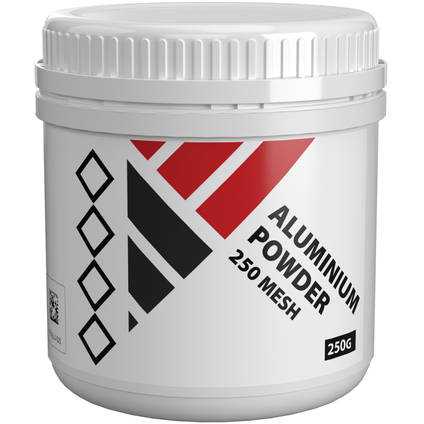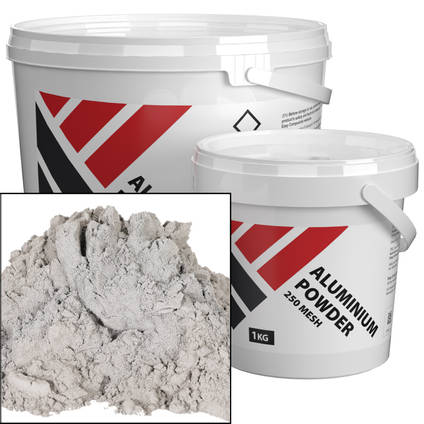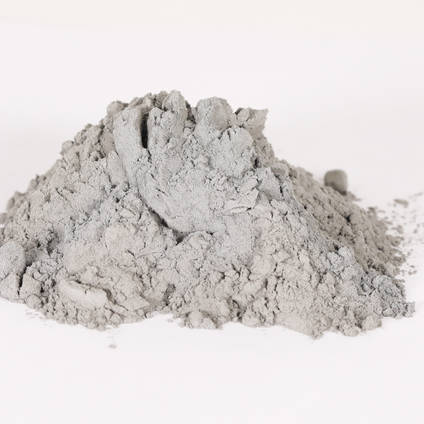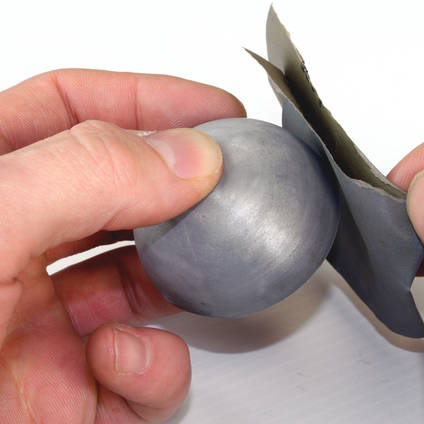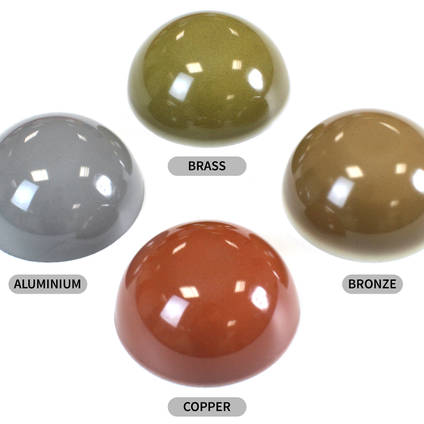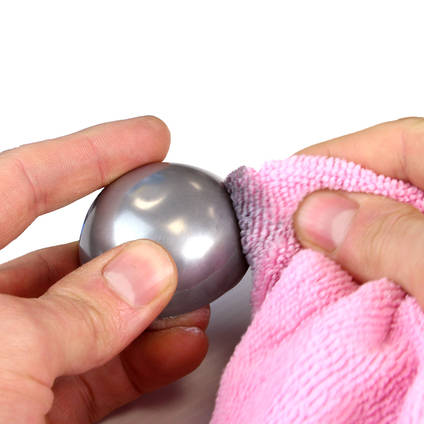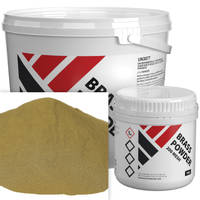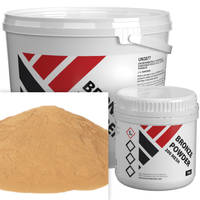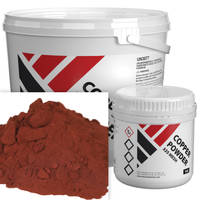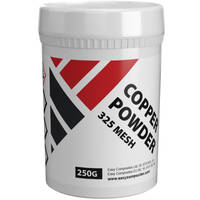Hulp of advies nodig?+44 (0)1782 454499
Specificatie
Productgegevens
| Kleur | Zilver | |
|---|---|---|
| Formaat | Poeder |
Compatibel Met
| Compatibel Met | Epoxy | Ja |
|---|---|---|
| Compatibel Met | Polyurethaan | Ja |
| Compatibel Met | Polyester | Ja |
| Compatibel Met | Vinylester | Ja |
Gewicht en Afmetingen
| Zuiverheid | 99.97 | % |
|---|---|---|
| Deeltjesgrootte | 250 | Gaas |
Algemene eigenschappen
| Brutogewicht | 0.312 | kg |
|---|
Verzendinformatie
Beperkingen
Dit product is niet geclassificeerd als gevaarlijke goederen voor transport en kan zonder beperkingen naar alle bestemmingen worden verzonden.
Verpakkingsgrootte
Er zijn geen beperkingen op de verpakkingsgrootte of toeslagen voor dit product.
Bezorgkosten
Om de bezorgkosten van dit artikel naar uw adres te vinden, voegt u het toe aan uw winkelwagen en gebruikt u vervolgens de directe verzendcalculator op de winkelwagenpagina.
Aluminiummetaalpoeder
- FP-ALU-025
- Geen beoordelingen
Zeer zuiver, zeer fijn 250 mesh aluminium metaalpoeder, geschikt voor diverse toepassingen, waaronder harsgieten (koudgieten), decoratieve coatings en poedermetallurgie. Aluminiumpoeder kan ook aan harsen en gelcoats worden toegevoegd om hun thermische eigenschappen te wijzigen.
Ons aluminiumpoeder is online verkrijgbaar in verpakkingen van 250g, 1kg en 5kg.
PRODUCTVERSIES
Verpakkingsgrootte
BESCHIKBAARHEID:7 op voorraad beschikbaar voor onmiddellijke verzending
Wij zijn niet te verslaan op prijs!
Als u denkt dat u elders een gelijkwaardig product goedkoper kunt kopen, neem dan contact met ons op om uw wensen te bespreken.
Zeer fijn (250 mesh), zeer zuiver aluminium metaalpoeder, geschikt voor diverse toepassingen, waaronder harsgieten of het wijzigen van de eigenschappen van harsen of gelcoats.
Hoe te Kopen
Aluminiumpoeder wordt verkocht in verpakkingen van 250g, 1kg en 5kg. Kies de gewenste verpakkingsgrootte uit de keuzelijst bovenaan de pagina.
Verpakkingen van 25kg zijn op aanvraag verkrijgbaar; neem contact met ons op voor de prijs.
Verdere Informatie
Hoe te gebruiken
Een verhouding van ten minste 50% aluminiumpoeder (op gewicht) is nodig voor een significant metaalachtig uiterlijk. Hogere verhoudingen, tot de grens van gietbaarheid, zullen een indrukwekkender metaalachtig uiterlijk en gevoel opleveren.
Na het gieten zal het metallieke uiterlijk niet helder of levendig zijn, omdat de metaaldeeltjes verborgen zijn achter een dunne laag hars. Om het metallieke uiterlijk te onthullen, kan het gietstuk worden gewreven met een schuurpad of staalwol.
Wanneer metaalpoeders worden toegevoegd aan polyester- of vinylesterharssystemen, is het belangrijk om de hars te katalyseren voordat het metaalpoeder wordt toegevoegd, om een nadelige reactie (snelle oxidatie) van het metaalpoeder door de katalysator te voorkomen.
Dergelijke oxidatie of andere nadelige reacties zijn onwaarschijnlijk bij polyurethaan- of epoxyharsen, maar het kan toch een goed idee zijn om de hars en de harders samen te mengen voordat het metaalpoeder wordt toegevoegd.
Gebruik bij Koudgieten / Harsgieten
Voeg aluminiumpoeder toe aan gietharsen zoals polyurethaan Fast-Cast harsen, polyesters of epoxies voor een authentiek metaalachtig aluminium uiterlijk en gevoel.
Toegevoegd aan het gehele harsmengsel, verhoogt aluminiumpoeder de dichtheid van een gietstuk (waardoor het zwaarder aanvoelt) en de thermische geleidbaarheid (waardoor het kouder aanvoelt). Als alternatief kan het in hogere verhoudingen worden toegevoegd aan slechts een dunne oppervlaktelaag door middel van slush-casting of rotatiegieten, wat een zeer metaalachtig oppervlak geeft aan een gietstuk dat vervolgens kan worden opgevuld met ongevulde hars.
Voor het toevoegen van temperatuurstabiliteit
Aluminiumpoeder wordt zeer vaak toegevoegd aan harsen en gelcoats om hun dimensionale stabiliteit te verbeteren, met name voor gebruik bij verhoogde temperaturen.
Epoxy tooling gelcoats, lamineerpasta's en gietharsen kunnen allemaal worden gevuld met aluminiumpoeder om hun dimensionale stabiliteit bij hoge temperaturen te verbeteren.
Zeer fijn (250 mesh), zeer zuiver aluminium metaalpoeder, geschikt voor diverse toepassingen, waaronder harsgieten of het wijzigen van de eigenschappen van harsen of gelcoats.
Hoe te Kopen
Aluminiumpoeder wordt verkocht in verpakkingen van 250g, 1kg en 5kg. Kies de gewenste verpakkingsgrootte uit de keuzelijst bovenaan de pagina.
Verpakkingen van 25kg zijn op aanvraag verkrijgbaar; neem contact met ons op voor de prijs.
Verdere Informatie
Hoe te gebruiken
Een verhouding van ten minste 50% aluminiumpoeder (op gewicht) is nodig voor een significant metaalachtig uiterlijk. Hogere verhoudingen, tot de grens van gietbaarheid, zullen een indrukwekkender metaalachtig uiterlijk en gevoel opleveren.
Na het gieten zal het metallieke uiterlijk niet helder of levendig zijn, omdat de metaaldeeltjes verborgen zijn achter een dunne laag hars. Om het metallieke uiterlijk te onthullen, kan het gietstuk worden gewreven met een schuurpad of staalwol.
Wanneer metaalpoeders worden toegevoegd aan polyester- of vinylesterharssystemen, is het belangrijk om de hars te katalyseren voordat het metaalpoeder wordt toegevoegd, om een nadelige reactie (snelle oxidatie) van het metaalpoeder door de katalysator te voorkomen.
Dergelijke oxidatie of andere nadelige reacties zijn onwaarschijnlijk bij polyurethaan- of epoxyharsen, maar het kan toch een goed idee zijn om de hars en de harders samen te mengen voordat het metaalpoeder wordt toegevoegd.
Gebruik bij Koudgieten / Harsgieten
Voeg aluminiumpoeder toe aan gietharsen zoals polyurethaan Fast-Cast harsen, polyesters of epoxies voor een authentiek metaalachtig aluminium uiterlijk en gevoel.
Toegevoegd aan het gehele harsmengsel, verhoogt aluminiumpoeder de dichtheid van een gietstuk (waardoor het zwaarder aanvoelt) en de thermische geleidbaarheid (waardoor het kouder aanvoelt). Als alternatief kan het in hogere verhoudingen worden toegevoegd aan slechts een dunne oppervlaktelaag door middel van slush-casting of rotatiegieten, wat een zeer metaalachtig oppervlak geeft aan een gietstuk dat vervolgens kan worden opgevuld met ongevulde hars.
Voor het toevoegen van temperatuurstabiliteit
Aluminiumpoeder wordt zeer vaak toegevoegd aan harsen en gelcoats om hun dimensionale stabiliteit te verbeteren, met name voor gebruik bij verhoogde temperaturen.
Epoxy tooling gelcoats, lamineerpasta's en gietharsen kunnen allemaal worden gevuld met aluminiumpoeder om hun dimensionale stabiliteit bij hoge temperaturen te verbeteren.
Specificatie
Productgegevens
| Kleur | Zilver | |
|---|---|---|
| Formaat | Poeder |
Compatibel Met
| Compatibel Met | Epoxy | Ja |
|---|---|---|
| Compatibel Met | Polyurethaan | Ja |
| Compatibel Met | Polyester | Ja |
| Compatibel Met | Vinylester | Ja |
Gewicht en Afmetingen
| Zuiverheid | 99.97 | % |
|---|---|---|
| Deeltjesgrootte | 250 | Gaas |
Algemene eigenschappen
| Brutogewicht | 0.312 | kg |
|---|
Metaalpoeders zijn, tegen de verwachting in, slechte geleiders. Ten eerste bestaat een metaalpoeder voor een aanzienlijk deel uit lucht. Je hebt veel deeltjes waarvan je zou verwachten dat ze elkaar raken, wat ook zo is, maar het contactpunt is mogelijk slechts een fractie van het oppervlak van elk deeltje (of het nu bolvormig of onregelmatig is), dus je hebt veel contactpunten, maar ze zijn vrij klein, en wat je eigenlijk hebt zijn veel openingen, dus je hebt slechts een fractie van de metallische "continuïteit" (ik kan geen beter woord bedenken) door het sample dat je zou verwachten. Ten tweede is er bij alle metaalpoeders een minuscuul laagje oxide op het oppervlak van elk deeltje, zoals je zou hebben op het oppervlak van een massief metaal. Dit zal een kleine hoeveelheid weerstand geven op bijvoorbeeld een massief stuk metaal, maar vermenigvuldig dat met de duizenden/miljoenen deeltjes in het sample en deze weerstand wordt significant, oplopend tot het punt waarop het metaal schijnbaar niet geleidt. In werkelijkheid geleidt het wel, maar niet veel. Er is meestal genoeg geleiding voor bijvoorbeeld antistatische eigenschappen, maar dat is het wel zo'n beetje. Ik zou denken dat je in een hars de geleidbaarheid waarschijnlijk nog meer verlaagt omdat je sommige van de toch al kleine contactpunten gaat blokkeren. Er bestaan metaalpoeders voor geleidbaarheidstoepassingen, zoals koper met zilvercoating of zelfs zilver of goud (hogere geleidbaarheid en minder oxidatie), maar zoals je je kunt voorstellen worden die erg duur.
Ja, het zou mogelijk zijn om een hars te spuiten waarin metaalpoeder is gemengd, dit betekent echter niet noodzakelijk dat het eindresultaat precies is wat u voor ogen heeft. Epoxyharsen spuiten bijvoorbeeld over het algemeen niet bijzonder goed en wanneer ze worden gespoten, kan dit ze vaak op een ongewenste manier beluchten, vooral varianten met een hogere viscositeit.
Wat betreft apparatuur, als u hars spuit (ervan uitgaande dat we het hebben over een hars met een relatief hoge viscositeit, zoals epoxy), dan zou u een spuitpistool met een grote spuitmond nodig hebben, zoals een gelcoat spuitpistool; dit zou ook helpen om de metaalpoederdeeltjes te verwerken. Gelcoat spuitpistolen zoals die waarnaar wordt gelinkt, kunnen daadwerkelijk worden gebruikt om deeltjes ter grootte van zand te spuiten (voor zandstralen op kleine schaal), dus dat zou zeker de beste optie zijn.
Een laatste punt om te overwegen is de gezondheids- en veiligheidskant van het spuiten van harsen. Vooral epoxies zouden een grote zorg zijn bij het spuiten, omdat ze op een manier worden verneveld die ze anders nooit zouden doen als ze normaal werden gebruikt, dus wees hierin zeer voorzichtig en lees alle relevante veiligheidsinformatie.
Omdat het een zuiver poeder is, is het verneveld, niet geschilferd.
...Ik zou dit mengsel willen gebruiken om elektronica te beschermen tegen de elementen en als een gelijkmatige verbindingslaag tussen koellichaam en componenten.
Ja en nee. Het toevoegen van metaalpoeder aan een hars verhoogt wel de thermische geleidbaarheid en de specifieke warmtecapaciteit van het materiaal, maar de toename in geleidbaarheid is minder dan u zou verwachten vanwege de manier waarop de harsmatrix (die een relatief slechte warmtegeleider is) elk metaaldeeltje omringt, waardoor de metaaldeeltjes tot op zekere hoogte van elkaar worden geïsoleerd. Desalniettemin zal aluminiumpoeder de geleidbaarheid en thermische stabiliteit verhogen van elk gelcoat- of harssysteem waaraan het wordt toegevoegd.
Deze metaalpoeders zijn meer bedoeld voor koudgieten om een solide metaaleffect in een hars te verkrijgen. Ze zullen geen metaalvlok- of parelmoerachtig effect creëren zoals u dat typisch zou zien in verven en sommige gietharsen. Voor dat soort effect heeft u gespecialiseerde metaalvlokken en parelmoerpoeders nodig. PearlEx en andere merken bieden een reeks metaalpoeders om het soort effect te creëren dat u zoekt.
STEL UW EIGEN VRAAG
Klantrecensies voor Aluminium Metaalpoeder
DIEN UW EIGEN PRODUCTBEOORDELING IN
We publiceren alle beoordelingen van geverifieerde aankopen. Dien uw eigen beoordeling in en help andere klanten met hun keuze.DIEN UW EIGEN PRODUCTBEOORDELING IN
We publiceren alle beoordelingen van geverifieerde aankopen. Dien uw eigen beoordeling in en help andere klanten met hun keuze.Verzendinformatie
Beperkingen
Dit product is niet geclassificeerd als gevaarlijke goederen voor transport en kan zonder beperkingen naar alle bestemmingen worden verzonden.
Verpakkingsgrootte
Er zijn geen beperkingen op de verpakkingsgrootte of toeslagen voor dit product.
Bezorgkosten
Om de bezorgkosten van dit artikel naar uw adres te vinden, voegt u het toe aan uw winkelwagen en gebruikt u vervolgens de directe verzendcalculator op de winkelwagenpagina.
GERELATEERDE PRODUCTEN
KLANTEN KOCHTEN OOK
GERELATEERDE PRODUCTEN
KLANTEN KOCHTEN OOK
100% VEILIG
BETAALMETHODEN
Easy Composites EU B.V., geregistreerd in Nederland 73601195. Alle inhoud auteursrecht (C) Easy Composites Ltd, 2025. Alle rechten voorbehouden.
